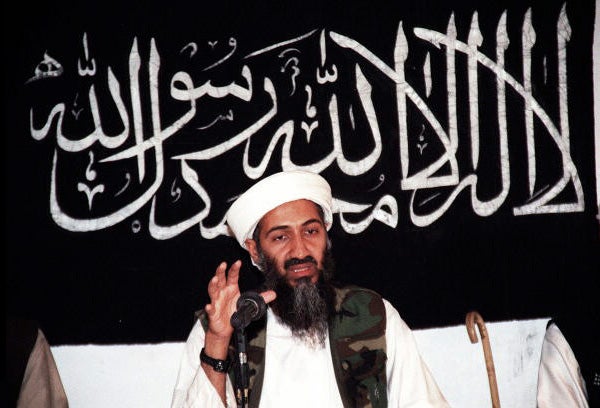|
May 2, 2011
Q&A: Stanford's Thomas Henriksen on the killing of Osama bin Laden
By Adam Gorlick

Osama bin Laden had a presence about him that garnered respect among members of al-Qaida members. (Photo by AFP/Getty Images) Thomas Henriksen, a senior fellow at Stanford's Hoover Institution, spoke with the Stanford News Service about the killing of Osama bin Laden, its impact on America's war on terror and the repercussions on the relationships among the United States, Afghanistan and Pakistan.
Henriksen specializes in the U.S. diplomatic and military courses of action toward terrorist havens and so-called rogue states. He is available to speak with the media and can be reached at (650) 723-4255 or henriksen@stanford.edu.
How big of a blow is Osama bin Laden's death to al-Qaida and other terrorist networks?
Many people are saying it's simply psychological or symbolic, but it's greater than that. It will make other terrorists more wary. They know we've been successful against a very elusive target. As a consequence, it will hamper their operations. It will make them hunker down and become less effective because they know they can't operate as openly. This won't put an end to terrorism, but America now looks stronger and more effective in fighting it. This has been a new kind of war for Americans. We were brought up fighting conventional wars, and suddenly we had to deal with very small networks that are almost impossible to penetrate. We've made some mistakes, and the CIA has been blamed for shortfalls. It takes a long time to learn to confront a different kind of enemy, but we have gotten better at it.
Bin Laden's influence over al-Qaida is said to have diminished since the 9/11 terrorist attacks. Who has taken his place, and what does al-Qaida's structure look like?
Some have also said that the second man in charge – Ayman al-Zawahiri – is probably a greater strategic thinker than Osama bin Laden ever was. But bin Laden had a presence about him and a greater resonance among al-Qaida members. Al-Qaida is incredibly decentralized and there are several franchises that operate in different parts of the world. That may have made bin Laden look not as important. But they all paid respect to him. They deferred to him and they wanted to be recognized by Osama bin Laden. They all wanted his stamp of approval. He played an important symbolic role even if his operational role was somewhat diminished after 9/11.
What is the likelihood of retaliation from al-Qaida?
There will be some retaliation. Some will be amateurish, almost knee-jerk reactions. But there will also be some long-range, more thought-through attacks. And they'll be done in the name of Osama bin Laden. But many of those attacks would've happened anyway. Killing bin Laden may give them an additional spurt of motivation, and we might have to suffer through that. But the greater downside would be if we did nothing about bin Laden and just let him go on. Then we'd look weak and ineffectual, and that would make us more vulnerable.
Bin Laden was killed in Pakistan after officials there insisted he had been hiding in Afghanistan. What does this say about Pakistan's commitment to fighting terrorism, and what will happen to the already strained relationship between the United States and Pakistan?
It largely depends on how we got this information that led to bin Laden's killing. Who leaked it to us? Was it from the Pakistani government? If so, what were the motives? If the information came unofficially, did it come from somebody in their intelligence service who wanted to get out from under the problem of dealing with bin Laden? Was it simply somebody who was paid off, or is it a combination of all that? Once we know that story, we can better tell how things will play out in the relationships among Pakistan, Afghanistan, the United States, Iran, Russia, China and everybody else involved in that region.
President Obama has said U.S. troops will begin withdrawing from Afghanistan in July. How does bin Laden's death affect American military strategy in Afghanistan?
This helps to make the case for withdrawing troops. Some might say the killing was timed to help that move, but I don't think so. The United States would've gone after Osama bin Laden if there was no troop withdrawal deadline. But there haven't been a lot of al-Qaida operatives in Afghanistan. The numbers are put somewhere between 100 and 300. Most of them are in Pakistan, and that poses a bigger threat. It's a bigger country, it has nuclear weapons and there are so many dangerous groups that have been active there. There are only a few variables that really count in the whole war in Afghanistan. One is our relationship to [Afghan President Hamid Karzai's government. And the other big piece is Pakistan, because it forms a haven for many of these terrorist groups.
What is the political gain for President Obama?
It's a boost. It will help him because he looks effective and strong. But in the long range, I don't know. The election is still a long way away. The American people are mostly worried about the economy and jobs, the price of gasoline and so on. So it might not play out. But it certainly can't hurt him politically, that's for sure.
-30-
|